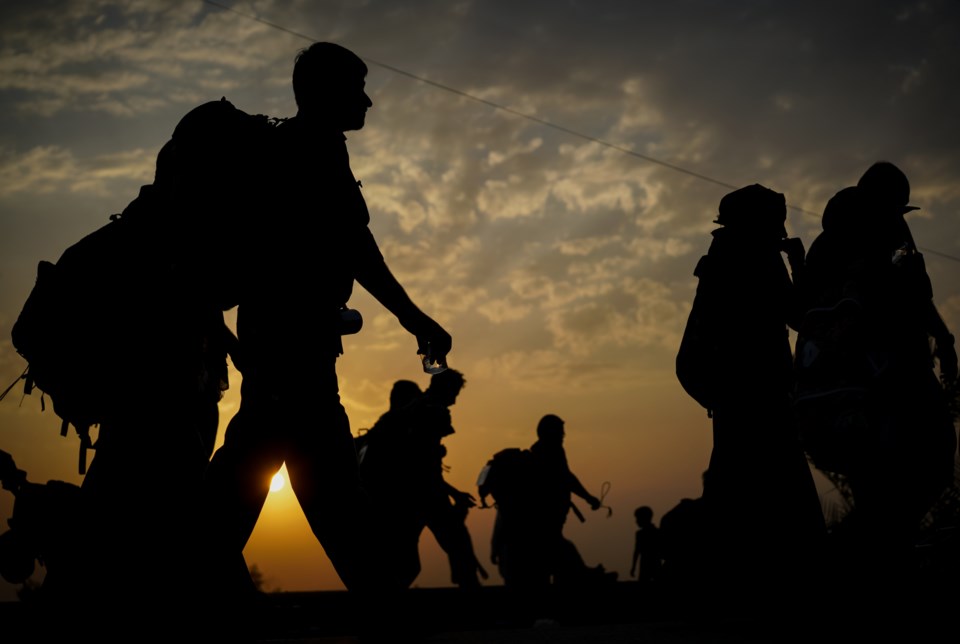OTTAWA — The Canadian representative for the United Nations refugee agency, UNHCR, says it's too early to begin resettling Ukrainian refugees who have fled Russian aggression in their country by the thousands.
Rema Jamous said the scale of displacement from Ukraine is daunting, as some 500,000 people have already fled to neighbouring countries seeking safety.
If trends continue, the UNHCR estimates there could be as many as four million Ukrainian refugees and up to 12 million people inside Ukraine who will need relief and protection.
Still, most people who left Ukraine hope to return home when it is safe to do so, she said.
"We're talking really, really early days for resettlement," Jamous said in an interview. "People will always want to go home before they think about going anywhere else."
Jamous' colleagues have reported large numbers of women and children crossing the border out of Ukraine, she said.
Vivid images of Ukrainians saying goodbye to their families while they take up arms against Russia to defend their homeland have also spread all over the world.
That leaves hundreds of thousands of refugees camped out in neighbouring countries awaiting the outcome of the war.
"You're going to see probably that people will stay close to the border area," Jamous said. "The overwhelming majority of refugees around the world will stay close to home and they will wait in neighbouring countries for an opportunity to return to their countries of origin."
Alexandra Rodionova lives in Aylmer, Que., but she said a part of her is still in Kyiv with her family. She immigrated to Canada in 1992, but her family and friends remain in Ukraine and plan to stay.
"It's very hard to tell or say what is the safest thing to do," Rodionova said in an interview.
The Canadian Council for Refugees said one solution would be to allow Ukrainians to enter Canada without a visa, offering a safe haven until it's safe to return home.
"A government should be facilitating them coming to find temporary safety in Canada," said executive director Janet Dench in an interview.
The House of Commons immigration committee voted Tuesday to call on the government to implement visa-free travel from Ukraine to Canada.
The vote passed without support of the Liberal members, who expressed concerns about domestic security if bad actors wished to enter the country.
The government is not currently reviewing visa requirements for Ukrainians, the House's foreign affairs committee heard Monday.
The UNHCR said refugees inside and outside of Ukraine's borders will need humanitarian support, as current resources are likely to be depleted quickly.
“We are looking at what could become Europe’s largest refugee crisis this century," UN High Commissioner for Refugees Filippo Grandi said in a written statement Tuesday.
The United Nations appealed Tuesday to governments for US$1.7 billion to cover the humanitarian costs of the crisis, including US$550.6 million to help refugees who have fled to nearby countries.
That money will be used to supply tents, heat, warm clothing, food and other essentials, Jamous said.
In response, Canada's International Development Minister Harjit Sajjan pledged $100 million in humanitarian assistance. That’s in addition to the $25 million Canada has already allocated to Ukraine this year.
The UNHCR has received reports that non-Ukrainians in the country have tried to flee violence only to be turned away by neighbouring countries or run into added difficulties while trying to escape.
Many of them are students, and in some cases they are refugees already from elsewhere in the world.
"At this critical juncture in particular, we simply cannot discriminate on the basis of legal status or nationality. People are fleeing war, they're literally fleeing for their lives," Jamous said.
The Embassy of Ukraine in Canada sent out a bulletin disputing that there has been any discrimination based on race or nationality, including when it comes to the crossing of the state border by foreign citizens.
"Given the extreme security conditions, the first-come, first-served approach applies to all nationalities, with certain humanitarian exceptions allowed for women and children," the bulletin read.
The Canadian Council for Refugees said Canada should be pressing governments to keep their borders open without discrimination.
"It's one of the fundamental principles of refugee law and obligations for countries, is to keep your borders open when refugees are fleeing. And that should be done without discrimination," said Dench.
The government should also give special consideration to people who were already refugees in Ukraine, and are now fleeing violence from Russia, she said, particularly those who were already in the process of applying to come to Canada.
The UNHCR will discuss resettlement options with countries like Canada at a later stage, but Jamous said typically the demand from people looking for a new home far outstrips the opportunities offered by governments.
The agency prioritizes people for resettlement who are considered most at risk.
Canada has already expedited existing immigration applications from Ukraine and has approved 4,000 since Jan. 19, Immigration Minister Sean Fraser said Monday.
Dench said there is always a concern that when a new crisis emerges, it will displace the efforts toward other refugee situations.
"We saw that with Syria, we saw that with Afghanistan, and the concern also emerges for Ukraine," she said. "If many countries divert their resources and attention to responding to this displacement, what does that mean for others who have been waiting for many years?"
Fraser said in a written statement Tuesday that Canada will keep doing its part as a global leader in refugee resettlement.
He repeated Canada's commitment to resettle 40,000 Afghan refugees, while ensuring Ukrainian citizens are able to come to Canada as safely and quickly as possible if they wish.
Fraser promised more details about plans to bring Ukrainians to the safety of Canada in the coming days.
This report by The Canadian Press was first published March 1, 2022.
— With files from Tobin Ng





